These changes promise to unleash creative potential, promote digital economic development and enhance national competitiveness in the era of Industry 4.0.

Press Conference Scene
At a press conference on the afternoon of July 7, the Ministry of Science and Technology announced that the 15th National Assembly had passed five laws that the ministry had chaired drafting at the 9th Session. The simultaneous passage of these laws just four months after the merger of the Ministry of Science and Technology and the Ministry of Information and Communications showed the State's strong determination to perfect the legal framework for science and technology.
Deputy Minister of Science and Technology Le Xuan Dinh affirmed that these five laws are "strong concrete steps" to realize the major orientations of Resolution 57-NQ/TW and the Resolutions of the Politburo. He emphasized that the entire ecosystem of science and technology, innovation and digital transformation is being re-established in the spirit of "openness, efficiency, speed, acceptance of controlled risks and maximum empowerment of implementing organizations".

Deputy Minister of Science and Technology Le Xuan Dinh delivered the opening speech at the Press Conference
The five laws passed include: Law on Science, Technology and Innovation (effective from October 1, 2025); Law on Digital Technology Industry; Law amending and supplementing a number of articles of the Law on Product and Goods Quality; Law amending and supplementing a number of articles of the Law on Technical Standards and Regulations; and Law on Atomic Energy (amended) - the last four laws taking effect from January 1, 2026.
Fundamental innovation in management thinking and operating mechanism
The biggest breakthrough of the Law on Science, Technology and Innovation is that for the first time, innovation is included in the law and placed on par with science and technology. Mr. Nguyen Phu Hung, Director of the Department of Science, Technology and Technology, said that this "represents a fundamental change in development thinking". Innovation is expected to contribute 3% to GDP growth, 3 times more than traditional science and technology.
The law also shifts the management focus from input control to result management and output efficiency assessment. This mechanism allows organizations and individuals performing research tasks to own research results for commercialization, and to enjoy at least 30% of the income from commercialization of research results. This regulation will create a strong driving force for the spirit of "dare to think, dare to do" in research, closely linking science and technology with socio-economic development.

Mr. Nguyen Phu Hung, Director of the Department of Science, Technology and Information Technology at the Press Conference
Deputy Minister Bui The Duy particularly emphasized the comprehensive transformation of the financial management mechanism in science and technology. Topics using the state budget will be applied with a lump sum mechanism, administrative procedures will be reduced and the transition from pre-audit to post-audit will be made transparent. All financial activities will be made transparent through a digital platform, allowing for public monitoring, risk assessment and actual effectiveness.
In the field of product quality, the Law amending and supplementing a number of articles of the Law on Product and Goods Quality demonstrates a new management mindset with 9 major orientations. Chairman of the National Committee for Standards, Metrology and Quality Ha Minh Hiep said that the law shifts from an administrative management model to a risk-based quality management model, from pre-inspection to post-inspection based on data and digital technology.

Mr. Ha Minh Hiep, Chairman of the National Committee for Standards, Metrology and Quality, informed at the Press Conference
For the first time, the law requires the establishment of a national product and goods quality monitoring system, connecting inter-sectoral data to support post-inspection and handling of quality risks. At the same time, the law clearly stipulates management of goods traded on digital platforms, enhancing the responsibility of sellers and intermediary platforms in quality assurance.
The Law amending and supplementing a number of articles of the Law on Standards and Technical Regulations also has many important new points. According to Mr. Ha Minh Hiep, for the first time there is a Declaration on standards, affirming that standards and technical regulations are "fundamental management tools, covering all socio-economic fields". The national standards strategy is legalized as a long-term orientation tool, at the same time establishing a national database on standards, measurement and quality.
The law stipulates the principle of "one product - one standard" nationwide, ending overlapping management and increasing enforcement efficiency. In particular, the mechanism for unilateral recognition of international assessment results will help high-tech enterprises quickly access the market, reducing the time and cost of complying with technical regulations.

Mr. Nguyen Khac Lich, Director of the Department of Information Technology Industry at the Press Conference
Digital technology and artificial intelligence are prioritized for development.
The Law on Digital Technology Industry is assessed by the Director of the Department of Information Technology Industry Nguyen Khac Lich as a "major turning point" in establishing a legal framework for new fields such as the semiconductor industry, artificial intelligence and digital assets. The law stipulates a strategy for developing specialized chips, linking global supply chains, creating a foundation for Vietnam to participate deeply in the global technology value chain.
Regarding artificial intelligence, the law sets out the principle of “human-centeredness”, requiring AI digital technology products to have clear identification marks. The State provides the highest preferential policies to promote research, development, deployment and use of AI. This is a strong signal showing that Vietnam is determined to become one of the pioneering countries in the application of artificial intelligence.
A particularly important point is that for the first time, digital assets including virtual assets and crypto assets have guaranteed ownership, transactions and security. This regulation creates a legal basis for the development of the digital economy, blockchain and new financial technologies, while protecting the rights of users in the digital environment.
The law also prioritizes investment in essential digital infrastructure such as AI data centers, concentrated digital technology parks and national laboratories. These infrastructures will create a solid foundation for the strong development of digital transformation and Vietnam's digital economy.
In particular, the law focuses on three pillars of human resource development: developing human resources for the digital technology industry; attracting high-quality human resources; and attracting and promoting digital industry talents. Strong investment in human resources is considered a decisive factor for the success of the national digital transformation strategy.

Mr. Nguyen Hoang Linh, Director of the Department of Radiation and Nuclear Safety, informed at the Press Conference
The amended Law on Atomic Energy also has many important new points. Director of the Department of Radiation and Nuclear Safety Nguyen Hoang Linh said that the law creates a comprehensive legal framework, in line with the guidelines of the International Atomic Energy Agency (IAEA). Nuclear power is identified as a national strategy, contributing to ensuring energy security and reducing carbon emissions.
The important new point is that nuclear safety and security management is unified by a competent state agency, according to international standards and manages the entire plant life cycle. The law also has a separate chapter on nuclear facility safety and promotes the application of atomic energy in medicine, agriculture and industry.

Deputy Minister of Science and Technology Bui The Duy speaks at the Press Conference
Synchronous deployment and breakthrough expectations
To ensure that the five laws come into effect soon, Deputy Minister Bui The Duy affirmed that the Ministry will issue decrees and guiding circulars at the same time as the law takes effect, ensuring timeliness and avoiding "legal gaps". The Law on Science, Technology and Innovation takes effect from October 1, 2025, so the accompanying decrees and circulars must also take effect on the same date.
A series of procedures will be shortened and simplified, creating conditions for businesses, research institutes and universities to be more proactive in participating in implementing scientific and technological tasks. Decentralization and delegation of authority will be expanded, enhancing autonomy, but still accompanied by strict post-audit supervision to ensure effective use of resources from the state budget.
According to Resolution 57, from now until the end of 2025, the Ministry of Science and Technology will continue to be assigned to preside over the development of 4 more draft laws, including the Law on Digital Transformation (new law) and 3 amended laws: the Law on High Technology, the Law on Technology Transfer and the Law on Intellectual Property. Thus, in 2025 alone, the Ministry of Science and Technology will complete the submission of 9 draft laws - an unprecedented amount of work in history.
These laws, together with three previously issued laws, including the Telecommunications Law, the Frequency Law and the Electronic Transactions Law, will fully and comprehensively establish a legal corridor for science and technology activities, innovation and digital transformation, in accordance with the spirit of Resolution 57 and major resolutions of the Central Committee.
Deputy Minister Le Xuan Dinh emphasized the role of the press in conveying the spirit of innovation, arousing social consensus and promoting unity in the political system. He affirmed that this is a prerequisite for realizing the strategic goals of Resolution 57, contributing to affirming the key role of science and technology, innovation and digital transformation in national development.
With a complete legal framework, flexible operating mechanisms, science and technology, innovation and digital transformation will become important driving forces to promote economic growth, solving development problems at the local, industry and national levels. The adoption of these five laws demonstrates Vietnam's strong determination to build a modern digital economy, improve competitiveness and aim to become a high-income country by 2045.
Source: https://mst.gov.vn/5-luat-lon-thay-doi-can-ban-he-sinh-thai-khoa-hoc-cong-nghe-viet-nam-197251117204533847.htm















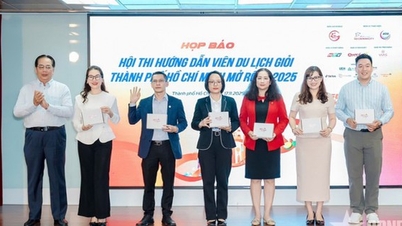





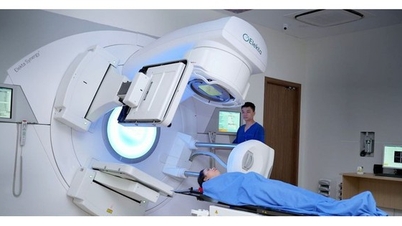


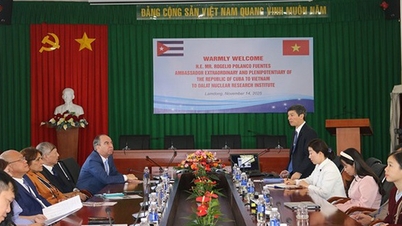

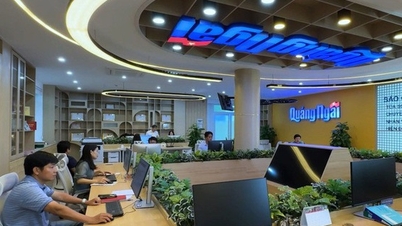
![[Photo] General Secretary To Lam and National Assembly Chairman Tran Thanh Man attend the 80th Anniversary of the Traditional Day of the Vietnamese Inspection Sector](https://vphoto.vietnam.vn/thumb/1200x675/vietnam/resource/IMAGE/2025/11/17/1763356362984_a2-bnd-7940-3561-jpg.webp)










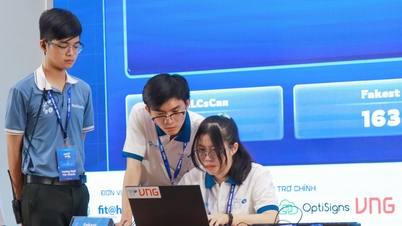































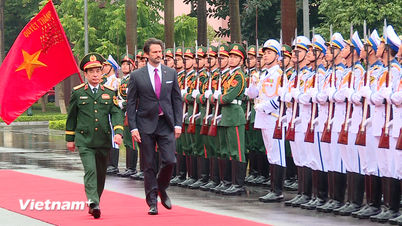






























Comment (0)